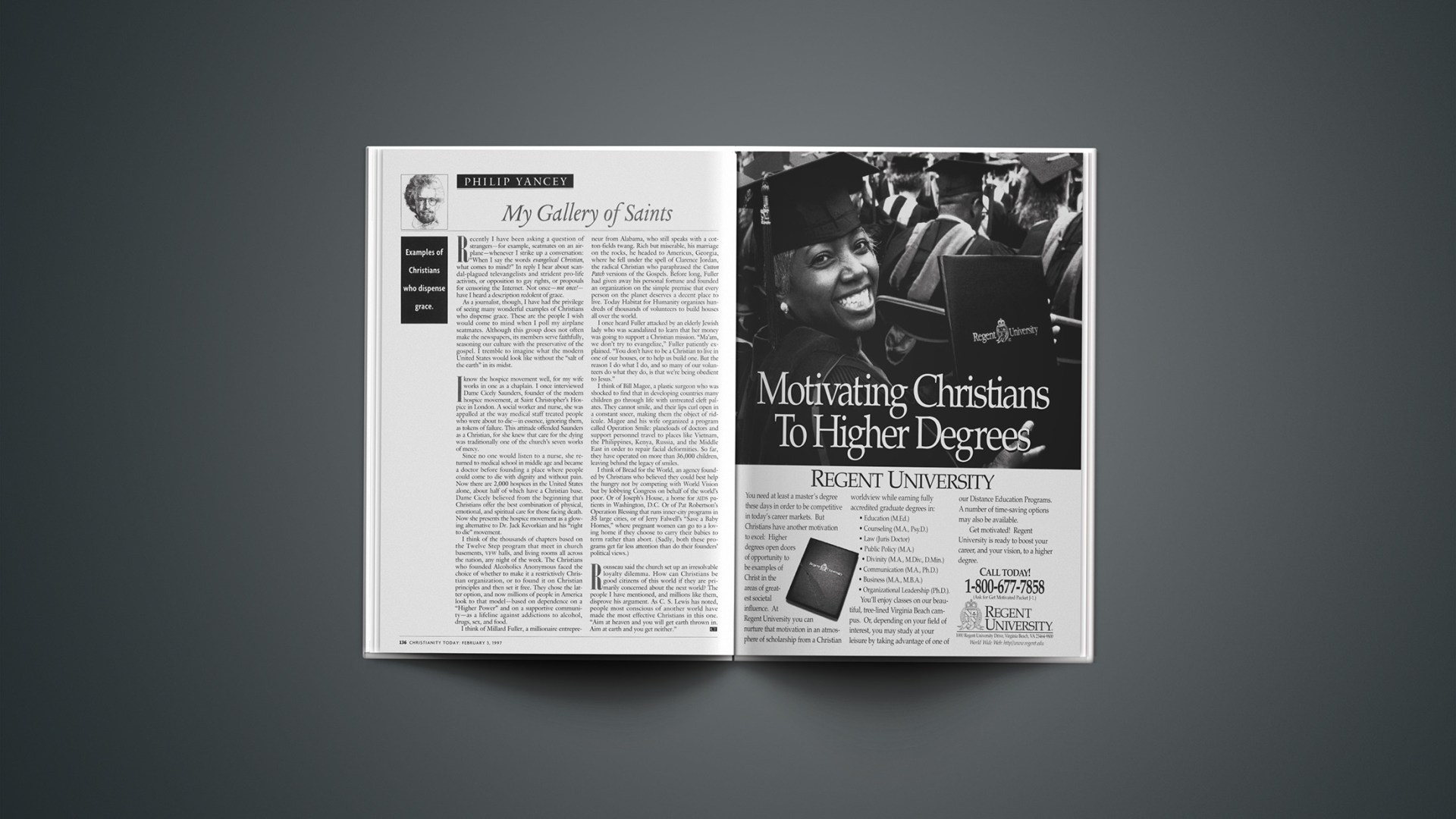Recently I have been asking a question of strangers—for example, seatmates on an airplane—whenever I strike up a conversation: “When I say the words evangelical Christian, what comes to mind?” In reply I hear about scandal-plagued televangelists and strident pro-life activists, or opposition to gay rights, or proposals for censoring the Internet. Not once—not once!—have I heard a description redolent of grace.
As a journalist, though, I have had the privilege of seeing many wonderful examples of Christians who dispense grace. These are the people I wish would come to mind when I poll my airplane seatmates. Although this group does not often make the newspapers, its members serve faithfully, seasoning our culture with the preservative of the gospel. I tremble to imagine what the modern United States would look like without the “salt of the earth” in its midst.
I know the hospice movement well, for my wife works in one as a chaplain. I once interviewed Dame Cicely Saunders, founder of the modern hospice movement, at Saint Christopher’s Hospice in London. A social worker and nurse, she was appalled at the way medical staff treated people who were about to die—in essence, ignoring them, as tokens of failure. This attitude offended Saunders as a Christian, for she knew that care for the dying was traditionally one of the church’s seven works of mercy.
Since no one would listen to a nurse, she returned to medical school in middle age and became a doctor before founding a place where people could come to die with dignity and without pain. Now there are 2,000 hospices in the United States alone, about half of which have a Christian base. Dame Cicely believed from the beginning that Christians offer the best combination of physical, emotional, and spiritual care for those facing death. Now she presents the hospice movement as a glowing alternative to Dr. Jack Kevorkian and his “right to die” movement.
I think of the thousands of chapters based on the Twelve Step program that meet in church basements, vfw halls, and living rooms all across the nation, any night of the week. The Christians who founded Alcoholics Anonymous faced the choice of whether to make it a restrictively Christian organization, or to found it on Christian principles and then set it free. They chose the latter option, and now millions of people in America look to that model—based on dependence on a “Higher Power” and on a supportive community—as a lifeline against addictions to alcohol, drugs, sex, and food.
I think of Millard Fuller, a millionaire entrepreneur from Alabama, who still speaks with a cotton-fields twang. Rich but miserable, his marriage on the rocks, he headed to Americus, Georgia, where he fell under the spell of Clarence Jordan, the radical Christian who paraphrased the Cotton Patch versions of the Gospels. Before long, Fuller had given away his personal fortune and founded an organization on the simple premise that every person on the planet deserves a decent place to live. Today Habitat for Humanity organizes hundreds of thousands of volunteers to build houses all over the world.
I once heard Fuller attacked by an elderly Jewish lady who was scandalized to learn that her money was going to support a Christian mission. “Ma’am, we don’t try to evangelize,” Fuller patiently explained. “You don’t have to be a Christian to live in one of our houses, or to help us build one. But the reason I do what I do, and so many of our volunteers do what they do, is that we’re being obedient to Jesus.”
I think of Bill Magee, a plastic surgeon who was shocked to find that in developing countries many children go through life with untreated cleft palates. They cannot smile, and their lips curl open in a constant sneer, making them the object of ridicule. Magee and his wife organized a program called Operation Smile: planeloads of doctors and support personnel travel to places like Vietnam, the Philippines, Kenya, Russia, and the Middle East in order to repair facial deformities. So far, they have operated on more than 36,000 children, leaving behind the legacy of smiles.
I think of Bread for the World, an agency founded by Christians who believed they could best help the hungry not by competing with World Vision but by lobbying Congress on behalf of the world’s poor. Or of Joseph’s House, a home for aids patients in Washington, D.C. Or of Pat Robertson’s Operation Blessing that runs inner-city programs in 35 large cities, or of Jerry Falwell’s “Save a Baby Homes,” where pregnant women can go to a loving home if they choose to carry their babies to term rather than abort. (Sadly, both these programs get far less attention than do their founders’ political views.)
Rousseau said the church set up an irresolvable loyalty dilemma. How can Christians be good citizens of this world if they are primarily concerned about the next world? The people I have mentioned, and millions like them, disprove his argument. As C. S. Lewis has noted, people most conscious of another world have made the most effective Christians in this one. “Aim at heaven and you will get earth thrown in. Aim at earth and you get neither.”
Copyright © 1997 Christianity Today. Click for reprint information.
February 3, 1997 Vol. 41, No. 2, Page 136










